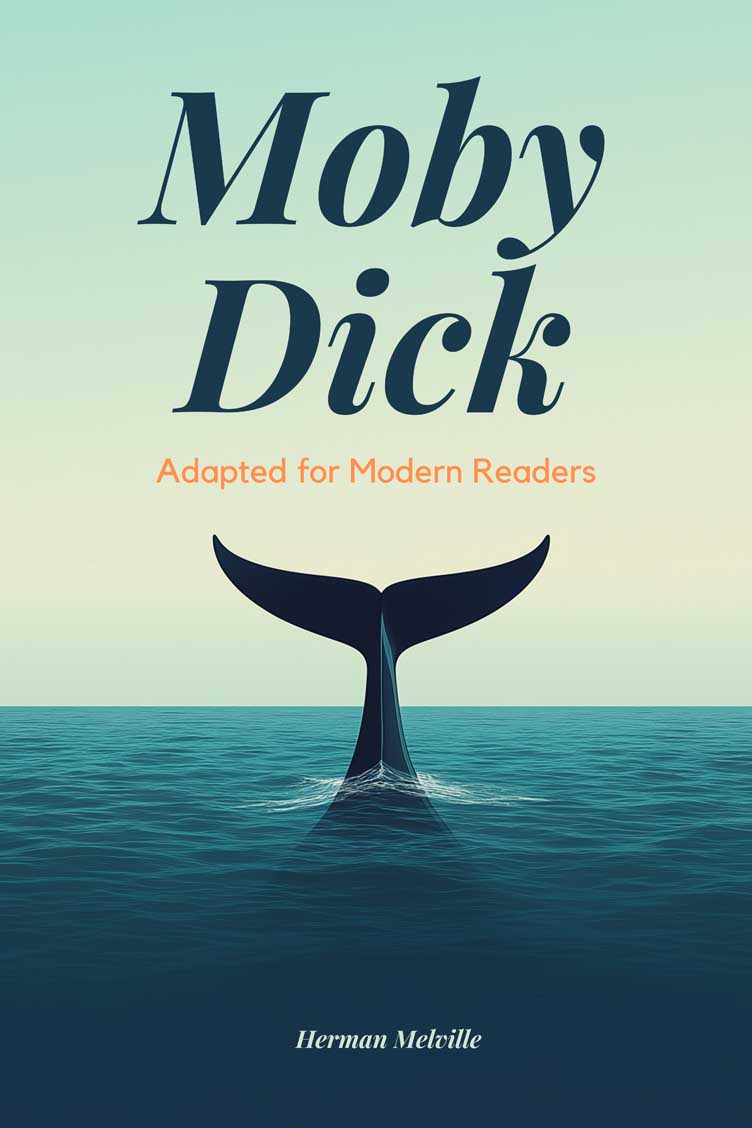Back to Classic Adaptations Purchase on Amazon
Purchase on Amazon

Moby-Dick
Adapted for Modern Readers
Classic Adaptation
THIS EDITION of Moby-Dick not only retains the heart of Herman Melville's timeless tale but also thoughtfully adapts the language for today's readers. We have modernized the vocabulary to clarify challenging terms and references, making the story more accessible without losing its original depth and richness. Whether for casual reading, book clubs, educational purposes, or family read-alouds, this edition offers a fresh yet faithful retelling of Moby-Dick.
Set sail with Captain Ahab and his crew aboard the Pequod as they embark on a relentless pursuit of the legendary white whale, Moby Dick. Filled with gripping action, philosophical musings, and vivid depictions of life at sea, this classic adventure is an exploration of obsession, fate, and the human spirit. Ideal for readers of all ages, this adaptation captures the essence of Melville's masterpiece while offering a smooth, engaging reading experience for modern audiences.
Sample Comparison
Original
Call me Ishmael. Some years ago - never mind how long precisely - having little or no money in my purse, and nothing particular to interest me on shore, I thought I would sail about a little and see the watery part of the world. It is a way I have of driving off the spleen and regulating the circulation. Whenever I find myself growing grim about the mouth; whenever it is a damp, drizzly November in my soul; whenever I find myself involuntarily pausing before coffin warehouses, and bringing up the rear of every funeral I meet; and especially whenever my hypos get such an upper hand of me, that it requires a strong moral principle to prevent me from deliberately stepping into the street, and methodically knocking people's hats off - then, I account it high time to get to sea as soon as I can. This is my substitute for pistol and ball. With a philosophical flourish Cato throws himself upon his sword; I quietly take to the ship. There is nothing surprising in this. If they but knew it, almost all men in their degree, some time or other, cherish very nearly the same feelings towards the ocean with me.
Adapted
Call me Ishmael. Some years ago - never mind exactly how long - having little or no money and nothing special to keep me on land, I thought I would sail around and see the watery part of the world. It's a way I have of cheering myself up and feeling better. Whenever I find myself feeling gloomy; whenever it feels like a cold, rainy November inside me; whenever I find myself stopping in front of coffin shops, or following every funeral I see; and especially whenever my bad moods get so strong that it takes a lot of willpower to stop myself from stepping into the street and knocking people's hats off - I know it's time to go to sea as soon as I can. This is my way of staying sane. Some people, like the philosopher Cato, might dramatically throw themselves on a sword; I quietly go to the ship. There's nothing surprising about this. If they knew it, almost all people, at some time or another, feel very much the same way about the ocean as I do.
About the Author

Herman Melville
Herman Melville (1819-1891) was an iconic American author, widely regarded as one of the greatest figures in American literature. Melville is best known for his epic novel Moby-Dick, a profound and adventurous tale that has left a lasting impact on readers and literary scholars alike.